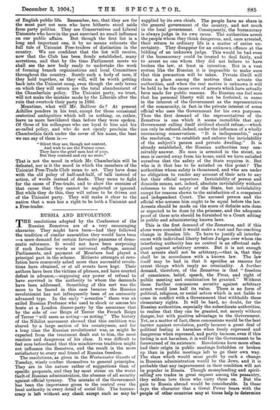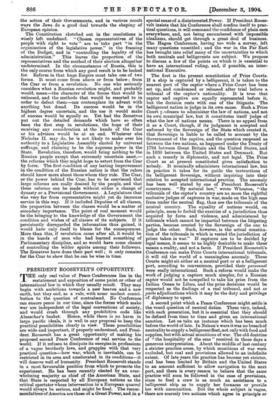T HE resolutions adopted by the Conference of the Russian Zemstvos
are of a very encouraging character. They might have been—had they followed the tradition of similar assemblies they would have been —a mere demand for certain favourite panaceas of demo- cratic reformers. It would not have been surprising if such familiar words as universal suffrage, annual Parliaments, and payment of Members had played a principal part in the scheme. Hitherto attempts at revo- lution have commonly asked more than successful revolu- tions have obtained, or at all events have kept. Their authors have been the victims of phrases, and have courted defeat in advance,—supposing any power of refusal to have survived in the authority to whom the demands have been addressed. Something of this sort was the more to be feared in this case because the Russian revolutionist has not infrequently been of an eminently advanced type. In the early " seventies " there was an exiled Russian Professor who used to shock or amuse his hosts at a London dinner-party by the assurance that by the side of our Reign of Terror the French Reign of Terror "will seem as noting—as noting." The history of the Nihilist movement showed that this ambition was shared by a large section of his countrymen, and for a long time the Russian revolutionist was, as might be expected from the treatment dealt out to him, the most resolute and dangerous of his class. It was difficult to feel sure beforehand that this mischievous tradition might not influence the Zemstvos, and the result is the more satisfactory to every real friend of Russian freedom. The resolutions, as given in the Westminster Gazette of Tuesday, wisely confine themselves to general principles. They are in the nature rather of suggestions than of specific proposals, and they lay most stress on the worst fault of Russian administration, the absence of all security against official tyranny. The mistake of the Government has been the importance given to the central over the local authority in every detail of social life. The bureau- cracy is left without any check except such as may be supplied by its own chiefs. The people have no share in the general government of the country, and not much in the local government. Consequently, the bureaucracy is always judge in its own cause. The authorities arrest the people whom they think dangerous, and, once arrested, their return to ordinary life is a matter of entire un- certainty. They disappear for an unknown offence at the bidding of an unknown judge. This would be bad even if the bureaucracy could be trusted to deal fairly, and to arrest no one whom they did not believe to have broken the law, at least in intention. But in a vast system like the Russian it is impossible to make, sure that this precaution will be taken. Private illwill will claim a place among the motives that actuate the authorities, and when the real motive is unknown it will be held to be the cause even of arrests which have actually been made for public reasons. No Russian can feel sure that his personal liberty will not be forfeited, in name in the interest of the Government as the representative of the community, in fact in the private interest of some official who uses the Government for his own purposes. Thus the first demand of the representatives of the. Zemstvos is one which it seems incredible that any Government calling itself civilised should refuse,—which can only be refused, indeed, under the influence of a wholly unreasoning conservatism. "It is indispensable," says the resolution, "to establish and enforce the inviolability of the subject's person and private dwelling." It is already established, the Russian authorities may con- ceivably answer. No man is arrested in the street, no man is carried away from his home, until we have satisfied ourselves that the safety of the State requires it. But who is it that has to be satisfied on this point? The authorities whose safety is threatened, and, who are under no obligation to render any account of their acts to any but their official superiors. Inviolability of person and domicile means, not, indeed, absolute inviolability without reference to the safety of the State, but inviolability except for reasons shown to the satisfaction of a competent and independent Court. The accused person and the official who accuses him ought to be equal before the law. Arrests should be made on the score of definite acts done or expected to be done by the prisoner, and the adequate proof of these acts should be furnished to a Court sitting in public and administering known laws.
This is the first demand of the Zemstvos, and if this alone were conceded it would make a vast and far-reaching change in Russian life. To have to justify all interfer- ences with individual liberty before Judges over whom the interfering authority has no control is an effectual safe- guard against arbitrary arrests. But it is not enough that arrests shall not be arbitrary,—that is, that they shall be in accordance with a known law. The law itself may be bad in that it specifies as reasons for arrest things which imply no criminality. A further demand, therefore, of the Zemstvos is that "freedom of conscience, belief, speech, the Press, and right of public meeting and combination be granted." Without these further concessions security against arbitrary arrest would lose half its value. There is no form of political, religious, or social action which is not liable to come in conflict with a Government that withholds these elementary rights. It will be hard, no doubt, for the Russian authorities, especially the subordinate authorities, to realise that they can be granted, not merely without danger, but with positive advantage to the Government. Yet, as a matter of fact, these concessions would be the best barrier against revolution, partly because a great deal of political feeling is harmless when freely expressed and dangerous when repressed, and partly because, even if this feeling is not harmless, it is well for the Government to be forewarned of its existence. Revolutions have more often had their origin in public meetings forbidden or broken up than in public meetings left to go their own way. The class which would most profit by such a change in Russian administration would be the Jews, and it is probable that any improvement in their condition will not be popular in Russia. Though moneylending and spirit- selling are trades in great request among the peasantry, they seldom love those who carry them on. But the gain to Russia abroad would be considerable. In these days the character that a Great Power bears with the people of other countries may at times help to determine The Constitution sketched out in the resolutions is wisely left undefined. "Chosen representatives of the people with right to vote" are to take part "in the organisation of the legislative power," in the framing of the Budget, and in "controlling the legality of the administration." This leaves the proportion of the representatives and the method of their election altogether undetermined. In the circumstances of Russia, this is the only course from which any good result is to be looked for. Reform in that huge Empire must take one of two forms. It must come from above or from below ; from the Czar or from a revolution. No one who seriously considers what a Russian revolution might, and probably would, mean—the character of the forces that would be unloosed, and the methods that would be resorted to in order to defeat them—can contemplate its advent with anything but dread. Its success would be in the highest degree uncertain, and the use it would make of success would be equally so. Yet had the Zemstvos put out the detailed demands which have so often been the first step in revolutions, the hope of their receiving any consideration at the hands of the Czar • or his advisers would be at an end. Whatever else Nicholas II. may do, he is not likely to make over his authority to a Legislative Assembly elected by universal suffrage, and claiming to be the supreme power in the State. Revolution, therefore, would bring nothing to the Russian people except that extremely uncertain asset,— the reforms which they might hope to extort from the Czar by force. The first condition of any lasting improvement in the condition of the Russian nation is that the rulers should know more about those whom they rule. The Czar, or the power behind the Czar, has to be convinced that large reforms are really desired by the people, and that these reforms can be made without either a change of dynasty or a Provisional Government. A Legislature that was very far from representative might yet do immense service in this way. If it included Deputies of all classes, the proportion between the classes would be a matter of secondary importance. The point of real moment would be the bringing to the knowledge of the Government the condition and wishes of all classes of its subjects. If it persistently disregarded the information thus gained, it would have only itself to blame for the consequences. More than this, if revolution came after all, it would be in the hands of men who had learned something of Parliamentary discipline, and so would have some chance of controlling the wilder spirits among their followers. The Zemstvos have done their part well ; it only remains for the Czar to show that he can be wise in time.
PRESIDENT ROOSEVELT'S OPPORTUNITY.







































































 Previous page
Previous page